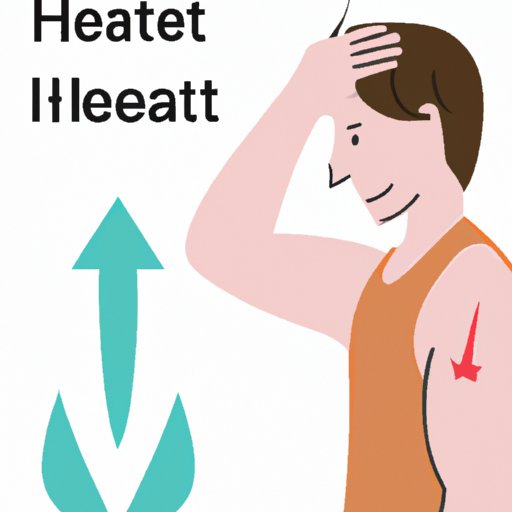
Introduction
As temperatures rise, it is essential to be aware of the potential dangers of heat exhaustion. Heat exhaustion is a condition that occurs due to prolonged exposure to high temperatures and inadequate hydration, resulting in the body’s inability to regulate its temperature. In this article, we will discuss the symptoms of heat exhaustion, its causes, and how to manage it.
The Basics of Heat Exhaustion
Heat exhaustion is a condition that happens when the body’s core temperature rises above its normal range of 97-99°F (36-37°C). The primary cause of heat exhaustion is staying out in the sun for too long or engaging in physical activities that generate a high body temperature without consuming enough fluids to stay hydrated.
Risk factors for heat exhaustion include:
- High humidity
- Strenuous exercise
- Overdressing
- Being overweight or obese
- Being a child or an older adult
- Having a medical condition affecting blood circulation or sweating
- Using certain medications, such as diuretics and antihistamines
Symptoms of Heat Exhaustion
It is essential to understand the early signs of heat exhaustion to prevent more serious health conditions. Common symptoms of heat exhaustion include:
- Headaches
- Dizziness or fainting
- Muscle cramps
- Weakness or fatigue
- Nausea or vomiting
- Excessive sweating
- Cool, damp skin
- Fast, shallow breathing
- Increased heart rate
Heat exhaustion can also lead to cognitive and behavioral symptoms such as confusion, irritability, and poor concentration.
Recognizing and Managing Heat Exhaustion Symptoms
If you or someone you know experiences symptoms of heat exhaustion, it is crucial to act quickly. Move to a cooler, shaded area and drink plenty of fluids. If possible, take a cool shower or use a damp towel to lower body temperature. Rest for a few hours, and avoid any physical activity until the symptoms subside.
To prevent heat exhaustion, it is essential to take extra precautions in hot weather. Wear lightweight and loose-fitting clothing, stay hydrated, and limit time outside during the hottest parts of the day. If you exercise outdoors, do so during cooler morning and evening hours and take frequent breaks in the shade.
If you experience severe symptoms, seek medical attention immediately. Healthcare providers may administer fluid through an intravenous line or recommend medications to lower body temperature.
The Body’s Response to Heat
The body has an efficient system for regulating core temperature. Blood vessels in the skin dilate, allowing excess heat to escape through the skin’s surface. Meanwhile, sweating helps to cool the body down by evaporating moisture. However, in extreme temperatures or without proper hydration, this system may fail, leading to heat exhaustion.
Early Warning Signs of Heat Exhaustion
The most effective way to prevent heat exhaustion is to identify early signs and take preventive measures. Symptoms to watch out for include increased thirst, fatigue, weakness, and muscle cramps. Those who are at higher risk, such as older adults and young children, may need to adjust their routines to avoid heat exhaustion. Avoiding excessive sunlight, staying indoors during peak temperatures, and drinking plenty of fluids can help prevent heat exhaustion.
Treating Heat Exhaustion Symptoms
If you experience heat exhaustion symptoms, you can take several self-care steps to recover. First and foremost, move to a cool, shaded area to rest and avoid strenuous activities. Drink plenty of fluids and replace lost electrolytes by consuming sports drinks or fruit juices.
If your symptoms do not subside within an hour, or they worsen, seek medical attention. In more severe cases, heat exhaustion can develop into heatstroke, which can be life-threatening if left untreated.
Conclusion
Heat exhaustion is a dangerous condition that can affect anyone, regardless of their age or health status. By being aware of the early symptoms, avoiding excessive heat exposure, staying hydrated, and taking prompt action, you can prevent heat exhaustion and stay safe and healthy during hot weather.
Remember to take care of yourself and those around you by being vigilant and taking preventive measures.





